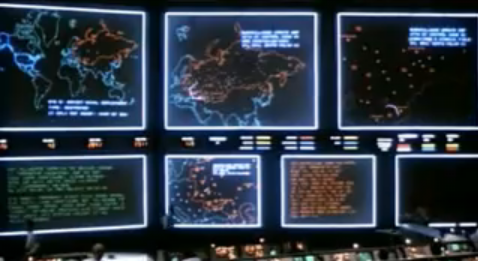Nick Rowe and I were both thinking about Borges’ Library of Babel the other day, though for different reasons (I think). For Nick it was part of another of his fun posts that start from way beyond leftfield and end up nice and close to home. I was trying to figure out something helpful and original to say about Wikileaks and what it means for journalism. This is where I’m at:
Imagine two libraries. The first library contains every important book that has ever been written. It’s a big library, but not that big. There is only one problem: it is very hard to get into. Access to the stacks is strictly controlled, and when it comes to the best and most important books, it is almost impossible for civilians to even see them. And so while the public knows where all the useful information is to be found, that doesn’t do them much good since they can’t get at it. It’s basically a useless library, so let’s call this the Library of Robarts.
The second library is much, much bigger than the first. It contains every possible book that could ever be written, from a book that is entirely blank except for a single “A” on the first page, to a book that is nothing but “zzzzzz” on every page. It also contains books of any arbitrary length, since individual volumes can be concatenated to form much longer books. Unlike the first library, this one is open to the public. Anyone can go in and wander the stacks to their hearts content, and is free to spend days, months, or even years in the reading rooms.
But this library, too, is totally useless. It's useless not despite its size, but because of its size. Imagine you are looking for a copy of Moby Dick. You find one that you think is the right one, except it is very hard to know for sure. That is because in addition to the true copy of Moby Dick, the library also contains every possible version of Moby Dick that varies from the true one by a single letter or punctuation mark. And one that varies by only two letters or punctuation marks. Here’s the key point: the only way you could ever know that you had the correct version of Moby Dick is if you already had a true version of Moby Dick! In order to find what you want in this library (called the Library of Babel) is if you already know what you are looking for. As Nick puts it, "What makes a library useful, indeed what makes a library a library, is not just what it contains, but what it does not contain. The optimal size of a library, even if we ignore the cost of books, librarians, and bricks and mortar, is finite."
From the public’s point of view, the ideal library would be mixture of the two regimes. We want the limited size (only the important books!) of the first library, but the open-access of the second.
So what does this mean for journalism? For most of its existence, journalism has taken place in a Library of Robarts world. Officials have secret information that the public wants. The job of the journalist has been to learn about, and hopefully obtain, information that is being kept secret. The journalist in this case is, literally, the medium through which important secret information becomes useful public information.
In the aftermath of the Wikileaks affair, some have argued that this is a sign that we are moving from a world where useful information is secret, and therefore scarce, to an era where useful information is public, and therefore plentiful. That in fact is Julian Assange’s stated goal: a world of absolute transparency, where there are no official secrets.
At first blush, this seems like the ideal mixed-library regime: All and only important official secrets will be made public. The truth will be out there, governments will be more accountable. And journalists will become obsolete, as we will have evolved, say some commentators, into a “post-journalism” world.
Is this plausible? I’m not sure. After all, the two libraries I talked about above are just examples of two ways of hiding a very important piece of information. You can secret it away in a place where no one can get it – put the papers in a safe, or secure it behind very hard encryption, for example. Or you can hide it in plain sight as it were, by embedding the one useful bit of information in a sea of irrelevant information.
Governments typically adopt the first tactic when trying to keep secrets. They put a classified stamp on it, limit its promulgation, lock it up, encrypt it, and so on. But sometimes, when faced with a pesky access to information request, they go the other way. They release the requested document along with a huge pile of other related documents, hoping to bury the needle of useful information in a big useless haystack. “You want information?” they say. “We’ll give you information!” That is, they switch from the Library of Robarts tactic to the Library of Babel tactic.
A big deal has been made about the sheer size of the Wikileaks document dump, with over 90 000 files made public and another 15 000 or so in the queue. Less frequently, it has been observed that the volume of information is not a feature of the leak, but a bug. In his post on the Wikileak, Jay Rosen wondered if the sheer scale of the revelations would have a counterproductive effect. Here is what he wrote:
We tend to think: big revelations mean big reactions. But if the story is too big and crashes too many illusions, the exact opposite occurs. My fear is that this will happen with the Afghanistan logs. Reaction will be unbearably lighter than we have a right to expect— not because the story isn’t sensational or troubling enough, but because it’s too troubling, a mess we cannot fix and therefore prefer to forget.
I think he gets the effect right (reaction has been pretty muted) but not the rationale. I don’t think people kinda shrugged at the Afghanistan logs because the scale of the problems they reveal seems intractable. Rather, I think it is because the scale of the information that was revealed is journalistically intractable. Wikileaks didn’t give us the happy medium library, with its combination of useful and public information, it gave us the Library of Babel, where every good story was hidden in a sea of otherwise useless data.
The lesson for Wikileaks is that information is better when it comes not in a torrent but in useful drips. That is something the Telegraph understood last year, when it tormented the British political class with daily Chinese-water torture revelations about MPs spending habits.
The lesson for journalism, I think, is that it doesn’t really matter which library system we’re operating in. Whether it’s all hidden in Robarts, or in plain view in Babel, the information still needs to be mediated. Except instead of making useful secrets public, the task of the journalist will be to show the public what is needle, and what is haystack. If anything, journalists in the Libary of Babel world will have to be be more knowledgeable, more specialized in the fields they cover, because in order to find the good stories, they'll already have to know what they are looking for.
 Monday, August 9, 2010 at 12:24PM
Monday, August 9, 2010 at 12:24PM  ABC,
ABC,  australia,
australia,  jeff sparrow,
jeff sparrow,  politics
politics 



